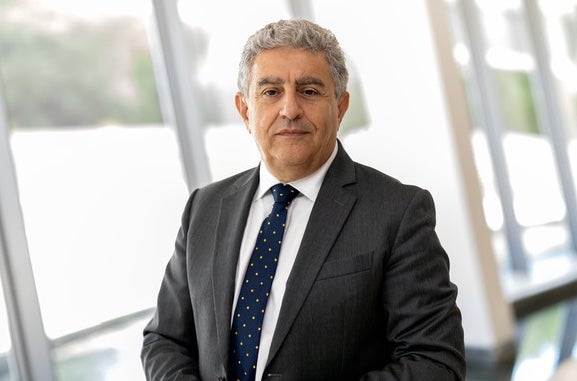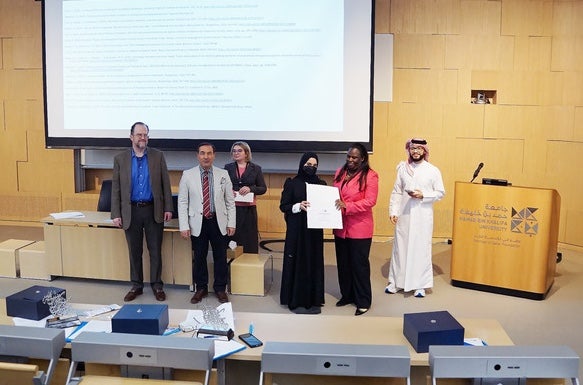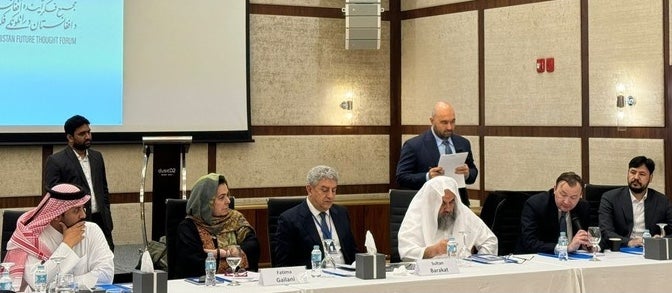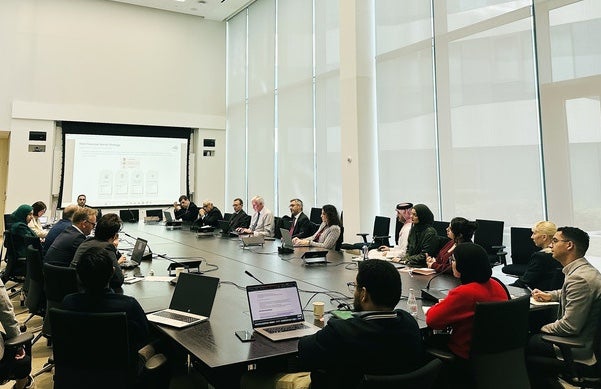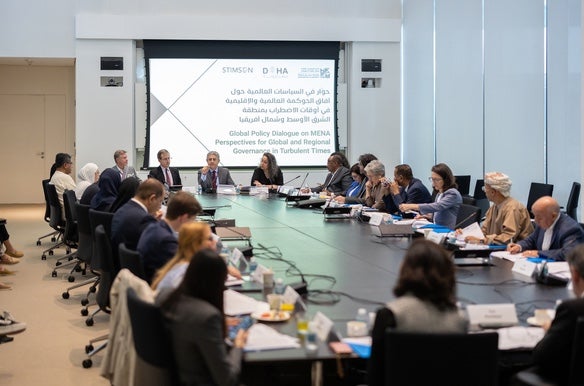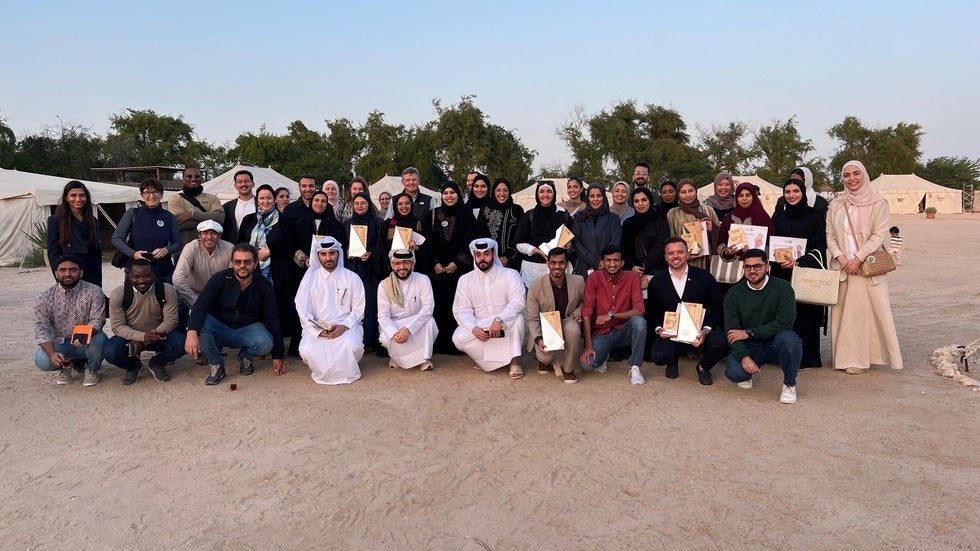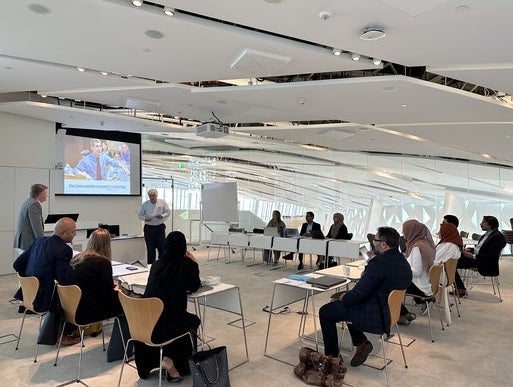
CPP Professor publishes Policy Brief on Reconstruction in Gaza
Dr. Sultan Barakat writes that post-conflict reconstruction must be based on the welfare of the Palestinian people, their right to sovereignty, in the context of a two-state solution
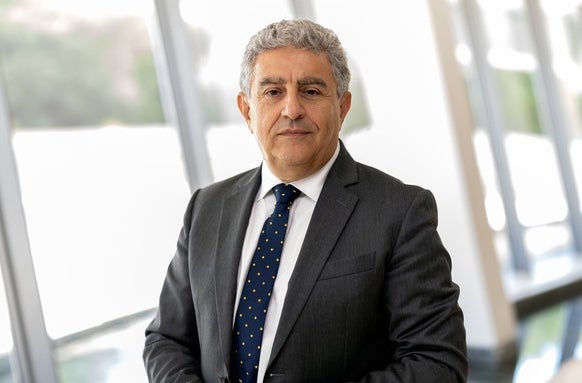
In his capacity as Academic Fellow at the University of Geneva’s Centre for Humanitarian Studies, Dr. Sultan Barakat, Professor, College of Public Policy (CPP), has published a policy brief titled Gaza: Leadership and Reconstruction for the “Day After”.
The brief outlines how leadership perspectives on reconstruction in Gaza post-conflict should be based first and foremost on the welfare of the Palestinian people as a social and humanitarian endeavor. It details how the process must cover political and institution building; economic reforms and financial security; and humanitarian and social reconciliation.
It also lists a variety of recommendations for international policymakers to consider, including calling for a ceasefire, formation of an international protection team composed of nations that have upheld international law throughout the conflict, establishment of a Palestinian interim government, and other policies.
Dr. Barakat collaborated with Dr. Paul Porteous, Director of Leadership and International Development, Institute for Governance and Policy Analysis, University of Canberra, to develop the brief.
Commenting on the publication, Dr. Barakat said: “The unprecedented destruction and dislocation of the population in Gaza necessitates a re-thinking of our understanding of the nature of conflict and post-conflict trajectories. At the College of Public Policy, we give priority to teaching and researching responses to policy questions of local, regional and global relevance - post-war reconstruction is an area of growing interest.”
“The approach advocated by Barakat and Porteous contrasts with the dominant U.S. and some European policy where the goal is solely the ‘security of Israel’ - this is very refreshing”, said Professor Barnett R. Rubin from New York University.
Related News
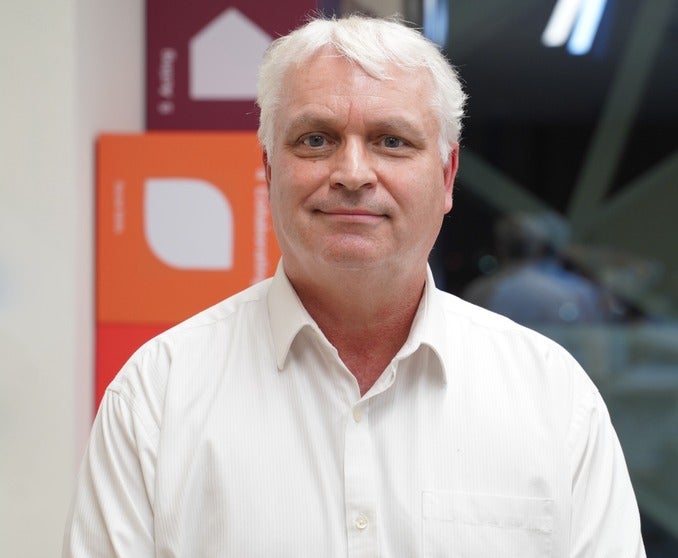
CPP Welcomes Dr. Mark Evans as Distinguished Visiting Professor of Public Value
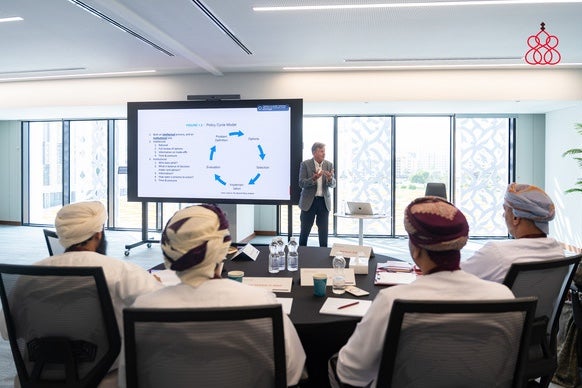
HBKU and Royal Academy of Management Deliver Module for 20 Omani Government Directors General

Dr. Motasem Hamdan Delivers First CPP Distinguished Visiting Professor Lecture
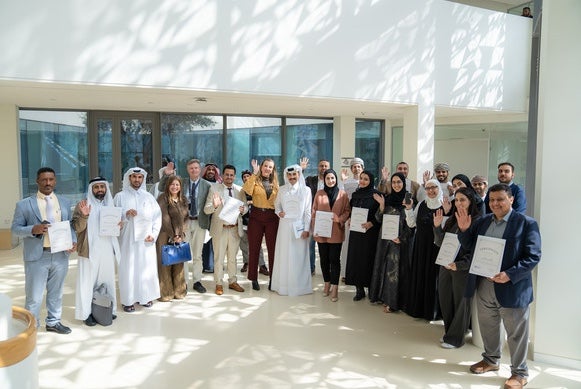
CPP Hosts ILO Regional Masterclass on Just Transition and Climate Policy for the First Time in Doha
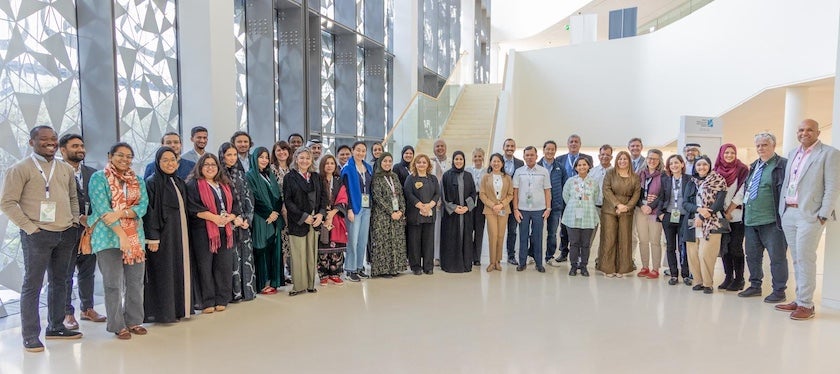
CPP and IPPA Bring International Winter School on Public Policy to Doha for the First Time
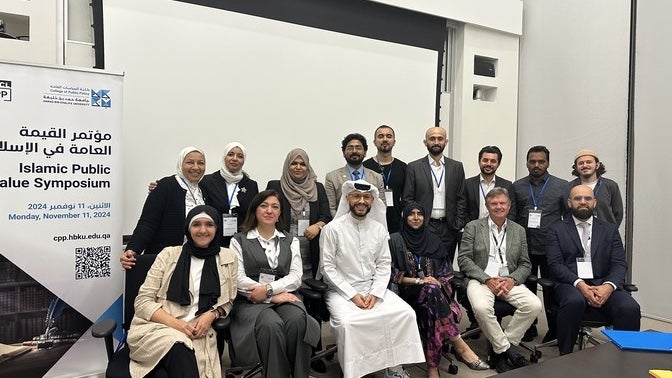
College of Public Policy Workshop Considers Principles and Values of Islamic Governance

CPP Welcomes Dr. Mark Evans as Distinguished Visiting Professor of Public Value

HBKU and Royal Academy of Management Deliver Module for 20 Omani Government Directors General

Dr. Motasem Hamdan Delivers First CPP Distinguished Visiting Professor Lecture

CPP Hosts ILO Regional Masterclass on Just Transition and Climate Policy for the First Time in Doha

CPP and IPPA Bring International Winter School on Public Policy to Doha for the First Time

College of Public Policy Workshop Considers Principles and Values of Islamic Governance

CPP Welcomes Dr. Mark Evans as Distinguished Visiting Professor of Public Value

HBKU and Royal Academy of Management Deliver Module for 20 Omani Government Directors General

Dr. Motasem Hamdan Delivers First CPP Distinguished Visiting Professor Lecture

CPP Hosts ILO Regional Masterclass on Just Transition and Climate Policy for the First Time in Doha

CPP and IPPA Bring International Winter School on Public Policy to Doha for the First Time

College of Public Policy Workshop Considers Principles and Values of Islamic Governance

CPP Welcomes Dr. Mark Evans as Distinguished Visiting Professor of Public Value

HBKU and Royal Academy of Management Deliver Module for 20 Omani Government Directors General

Dr. Motasem Hamdan Delivers First CPP Distinguished Visiting Professor Lecture

CPP Hosts ILO Regional Masterclass on Just Transition and Climate Policy for the First Time in Doha

CPP and IPPA Bring International Winter School on Public Policy to Doha for the First Time

College of Public Policy Workshop Considers Principles and Values of Islamic Governance

CPP Welcomes Dr. Mark Evans as Distinguished Visiting Professor of Public Value

HBKU and Royal Academy of Management Deliver Module for 20 Omani Government Directors General

Dr. Motasem Hamdan Delivers First CPP Distinguished Visiting Professor Lecture

CPP Hosts ILO Regional Masterclass on Just Transition and Climate Policy for the First Time in Doha

CPP and IPPA Bring International Winter School on Public Policy to Doha for the First Time

College of Public Policy Workshop Considers Principles and Values of Islamic Governance

CPP Welcomes Dr. Mark Evans as Distinguished Visiting Professor of Public Value

HBKU and Royal Academy of Management Deliver Module for 20 Omani Government Directors General

Dr. Motasem Hamdan Delivers First CPP Distinguished Visiting Professor Lecture

CPP Hosts ILO Regional Masterclass on Just Transition and Climate Policy for the First Time in Doha

CPP and IPPA Bring International Winter School on Public Policy to Doha for the First Time

College of Public Policy Workshop Considers Principles and Values of Islamic Governance

CPP Welcomes Dr. Mark Evans as Distinguished Visiting Professor of Public Value

HBKU and Royal Academy of Management Deliver Module for 20 Omani Government Directors General

Dr. Motasem Hamdan Delivers First CPP Distinguished Visiting Professor Lecture

CPP Hosts ILO Regional Masterclass on Just Transition and Climate Policy for the First Time in Doha

CPP and IPPA Bring International Winter School on Public Policy to Doha for the First Time

College of Public Policy Workshop Considers Principles and Values of Islamic Governance

CPP Welcomes Dr. Mark Evans as Distinguished Visiting Professor of Public Value

HBKU and Royal Academy of Management Deliver Module for 20 Omani Government Directors General

Dr. Motasem Hamdan Delivers First CPP Distinguished Visiting Professor Lecture

CPP Hosts ILO Regional Masterclass on Just Transition and Climate Policy for the First Time in Doha

CPP and IPPA Bring International Winter School on Public Policy to Doha for the First Time

College of Public Policy Workshop Considers Principles and Values of Islamic Governance

CPP Welcomes Dr. Mark Evans as Distinguished Visiting Professor of Public Value

HBKU and Royal Academy of Management Deliver Module for 20 Omani Government Directors General

Dr. Motasem Hamdan Delivers First CPP Distinguished Visiting Professor Lecture

CPP Hosts ILO Regional Masterclass on Just Transition and Climate Policy for the First Time in Doha

CPP and IPPA Bring International Winter School on Public Policy to Doha for the First Time

College of Public Policy Workshop Considers Principles and Values of Islamic Governance

CPP Welcomes Dr. Mark Evans as Distinguished Visiting Professor of Public Value

HBKU and Royal Academy of Management Deliver Module for 20 Omani Government Directors General

Dr. Motasem Hamdan Delivers First CPP Distinguished Visiting Professor Lecture

CPP Hosts ILO Regional Masterclass on Just Transition and Climate Policy for the First Time in Doha

CPP and IPPA Bring International Winter School on Public Policy to Doha for the First Time

College of Public Policy Workshop Considers Principles and Values of Islamic Governance

CPP Welcomes Dr. Mark Evans as Distinguished Visiting Professor of Public Value

HBKU and Royal Academy of Management Deliver Module for 20 Omani Government Directors General

Dr. Motasem Hamdan Delivers First CPP Distinguished Visiting Professor Lecture

CPP Hosts ILO Regional Masterclass on Just Transition and Climate Policy for the First Time in Doha

CPP and IPPA Bring International Winter School on Public Policy to Doha for the First Time

College of Public Policy Workshop Considers Principles and Values of Islamic Governance

CPP Welcomes Dr. Mark Evans as Distinguished Visiting Professor of Public Value

HBKU and Royal Academy of Management Deliver Module for 20 Omani Government Directors General

Dr. Motasem Hamdan Delivers First CPP Distinguished Visiting Professor Lecture

CPP Hosts ILO Regional Masterclass on Just Transition and Climate Policy for the First Time in Doha

CPP and IPPA Bring International Winter School on Public Policy to Doha for the First Time

College of Public Policy Workshop Considers Principles and Values of Islamic Governance

CPP Welcomes Dr. Mark Evans as Distinguished Visiting Professor of Public Value

HBKU and Royal Academy of Management Deliver Module for 20 Omani Government Directors General

Dr. Motasem Hamdan Delivers First CPP Distinguished Visiting Professor Lecture

CPP Hosts ILO Regional Masterclass on Just Transition and Climate Policy for the First Time in Doha

CPP and IPPA Bring International Winter School on Public Policy to Doha for the First Time

College of Public Policy Workshop Considers Principles and Values of Islamic Governance

CPP Welcomes Dr. Mark Evans as Distinguished Visiting Professor of Public Value

HBKU and Royal Academy of Management Deliver Module for 20 Omani Government Directors General

Dr. Motasem Hamdan Delivers First CPP Distinguished Visiting Professor Lecture

CPP Hosts ILO Regional Masterclass on Just Transition and Climate Policy for the First Time in Doha

CPP and IPPA Bring International Winter School on Public Policy to Doha for the First Time

College of Public Policy Workshop Considers Principles and Values of Islamic Governance

CPP Welcomes Dr. Mark Evans as Distinguished Visiting Professor of Public Value

HBKU and Royal Academy of Management Deliver Module for 20 Omani Government Directors General

Dr. Motasem Hamdan Delivers First CPP Distinguished Visiting Professor Lecture

CPP Hosts ILO Regional Masterclass on Just Transition and Climate Policy for the First Time in Doha

CPP and IPPA Bring International Winter School on Public Policy to Doha for the First Time

College of Public Policy Workshop Considers Principles and Values of Islamic Governance

CPP Welcomes Dr. Mark Evans as Distinguished Visiting Professor of Public Value

HBKU and Royal Academy of Management Deliver Module for 20 Omani Government Directors General

Dr. Motasem Hamdan Delivers First CPP Distinguished Visiting Professor Lecture

CPP Hosts ILO Regional Masterclass on Just Transition and Climate Policy for the First Time in Doha

CPP and IPPA Bring International Winter School on Public Policy to Doha for the First Time

College of Public Policy Workshop Considers Principles and Values of Islamic Governance

CPP Welcomes Dr. Mark Evans as Distinguished Visiting Professor of Public Value

HBKU and Royal Academy of Management Deliver Module for 20 Omani Government Directors General

Dr. Motasem Hamdan Delivers First CPP Distinguished Visiting Professor Lecture

CPP Hosts ILO Regional Masterclass on Just Transition and Climate Policy for the First Time in Doha

CPP and IPPA Bring International Winter School on Public Policy to Doha for the First Time

College of Public Policy Workshop Considers Principles and Values of Islamic Governance

CPP Welcomes Dr. Mark Evans as Distinguished Visiting Professor of Public Value

HBKU and Royal Academy of Management Deliver Module for 20 Omani Government Directors General

Dr. Motasem Hamdan Delivers First CPP Distinguished Visiting Professor Lecture

CPP Hosts ILO Regional Masterclass on Just Transition and Climate Policy for the First Time in Doha

CPP and IPPA Bring International Winter School on Public Policy to Doha for the First Time

College of Public Policy Workshop Considers Principles and Values of Islamic Governance

CPP Welcomes Dr. Mark Evans as Distinguished Visiting Professor of Public Value

HBKU and Royal Academy of Management Deliver Module for 20 Omani Government Directors General

Dr. Motasem Hamdan Delivers First CPP Distinguished Visiting Professor Lecture

CPP Hosts ILO Regional Masterclass on Just Transition and Climate Policy for the First Time in Doha

CPP and IPPA Bring International Winter School on Public Policy to Doha for the First Time

College of Public Policy Workshop Considers Principles and Values of Islamic Governance

CPP Welcomes Dr. Mark Evans as Distinguished Visiting Professor of Public Value

HBKU and Royal Academy of Management Deliver Module for 20 Omani Government Directors General

Dr. Motasem Hamdan Delivers First CPP Distinguished Visiting Professor Lecture

CPP Hosts ILO Regional Masterclass on Just Transition and Climate Policy for the First Time in Doha

CPP and IPPA Bring International Winter School on Public Policy to Doha for the First Time

College of Public Policy Workshop Considers Principles and Values of Islamic Governance

CPP Welcomes Dr. Mark Evans as Distinguished Visiting Professor of Public Value

HBKU and Royal Academy of Management Deliver Module for 20 Omani Government Directors General

Dr. Motasem Hamdan Delivers First CPP Distinguished Visiting Professor Lecture

CPP Hosts ILO Regional Masterclass on Just Transition and Climate Policy for the First Time in Doha

CPP and IPPA Bring International Winter School on Public Policy to Doha for the First Time

College of Public Policy Workshop Considers Principles and Values of Islamic Governance

CPP Welcomes Dr. Mark Evans as Distinguished Visiting Professor of Public Value

HBKU and Royal Academy of Management Deliver Module for 20 Omani Government Directors General

Dr. Motasem Hamdan Delivers First CPP Distinguished Visiting Professor Lecture

CPP Hosts ILO Regional Masterclass on Just Transition and Climate Policy for the First Time in Doha

CPP and IPPA Bring International Winter School on Public Policy to Doha for the First Time

College of Public Policy Workshop Considers Principles and Values of Islamic Governance

CPP Welcomes Dr. Mark Evans as Distinguished Visiting Professor of Public Value

HBKU and Royal Academy of Management Deliver Module for 20 Omani Government Directors General

Dr. Motasem Hamdan Delivers First CPP Distinguished Visiting Professor Lecture

CPP Hosts ILO Regional Masterclass on Just Transition and Climate Policy for the First Time in Doha

CPP and IPPA Bring International Winter School on Public Policy to Doha for the First Time

College of Public Policy Workshop Considers Principles and Values of Islamic Governance

CPP Welcomes Dr. Mark Evans as Distinguished Visiting Professor of Public Value

HBKU and Royal Academy of Management Deliver Module for 20 Omani Government Directors General

Dr. Motasem Hamdan Delivers First CPP Distinguished Visiting Professor Lecture

CPP Hosts ILO Regional Masterclass on Just Transition and Climate Policy for the First Time in Doha

CPP and IPPA Bring International Winter School on Public Policy to Doha for the First Time

College of Public Policy Workshop Considers Principles and Values of Islamic Governance

CPP Welcomes Dr. Mark Evans as Distinguished Visiting Professor of Public Value

HBKU and Royal Academy of Management Deliver Module for 20 Omani Government Directors General

Dr. Motasem Hamdan Delivers First CPP Distinguished Visiting Professor Lecture

CPP Hosts ILO Regional Masterclass on Just Transition and Climate Policy for the First Time in Doha

CPP and IPPA Bring International Winter School on Public Policy to Doha for the First Time

College of Public Policy Workshop Considers Principles and Values of Islamic Governance

CPP Welcomes Dr. Mark Evans as Distinguished Visiting Professor of Public Value

HBKU and Royal Academy of Management Deliver Module for 20 Omani Government Directors General

Dr. Motasem Hamdan Delivers First CPP Distinguished Visiting Professor Lecture

CPP Hosts ILO Regional Masterclass on Just Transition and Climate Policy for the First Time in Doha

CPP and IPPA Bring International Winter School on Public Policy to Doha for the First Time

College of Public Policy Workshop Considers Principles and Values of Islamic Governance

CPP Welcomes Dr. Mark Evans as Distinguished Visiting Professor of Public Value

HBKU and Royal Academy of Management Deliver Module for 20 Omani Government Directors General

Dr. Motasem Hamdan Delivers First CPP Distinguished Visiting Professor Lecture

CPP Hosts ILO Regional Masterclass on Just Transition and Climate Policy for the First Time in Doha

CPP and IPPA Bring International Winter School on Public Policy to Doha for the First Time

College of Public Policy Workshop Considers Principles and Values of Islamic Governance

CPP Welcomes Dr. Mark Evans as Distinguished Visiting Professor of Public Value

HBKU and Royal Academy of Management Deliver Module for 20 Omani Government Directors General

Dr. Motasem Hamdan Delivers First CPP Distinguished Visiting Professor Lecture

CPP Hosts ILO Regional Masterclass on Just Transition and Climate Policy for the First Time in Doha

CPP and IPPA Bring International Winter School on Public Policy to Doha for the First Time

College of Public Policy Workshop Considers Principles and Values of Islamic Governance

CPP Welcomes Dr. Mark Evans as Distinguished Visiting Professor of Public Value

HBKU and Royal Academy of Management Deliver Module for 20 Omani Government Directors General

Dr. Motasem Hamdan Delivers First CPP Distinguished Visiting Professor Lecture

CPP Hosts ILO Regional Masterclass on Just Transition and Climate Policy for the First Time in Doha

CPP and IPPA Bring International Winter School on Public Policy to Doha for the First Time

College of Public Policy Workshop Considers Principles and Values of Islamic Governance

CPP Welcomes Dr. Mark Evans as Distinguished Visiting Professor of Public Value

HBKU and Royal Academy of Management Deliver Module for 20 Omani Government Directors General

Dr. Motasem Hamdan Delivers First CPP Distinguished Visiting Professor Lecture

CPP Hosts ILO Regional Masterclass on Just Transition and Climate Policy for the First Time in Doha

CPP and IPPA Bring International Winter School on Public Policy to Doha for the First Time

College of Public Policy Workshop Considers Principles and Values of Islamic Governance

CPP Welcomes Dr. Mark Evans as Distinguished Visiting Professor of Public Value






